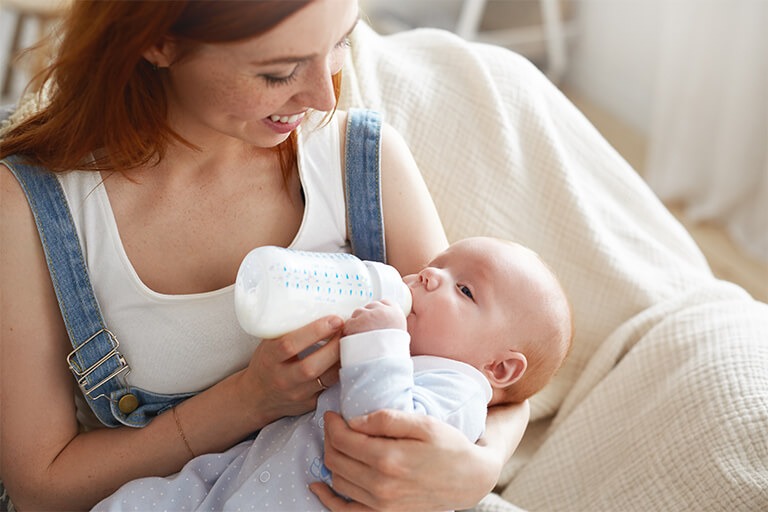Bottle-feeding refers to the act of feeding your baby formula or expressed breast milk from a bottle.
While a consultant neonatologist recommends exclusive breastfeeding, especially during the first six months, there are several reasons why you may choose to bottle-feed your baby.
Some mothers may not produce enough breast milk to meet the needs of their babies. In such cases, they may choose to supplement with formula.
Additionally, you may have medical conditions that prevent you from breastfeeding, such as mastitis, thrush, or a physical injury to the breast. Bottle feeding may also be considered if you are a working mother and need to return to work. Bottle feeding can be a convenient way to provide nutrition to your baby while you are away.
For personal reasons, you may prefer to bottle-feed because you find it to be more convenient or feel more comfortable with it. Bottle-feeding also enhances sharing of feeding responsibilities, for example, fathers or other caregivers may want to be involved in feeding the baby, and bottle-feeding allows for this.
It’s important to note that formula can provide the necessary nutrients for a growing baby, and there is no shame in choosing to bottle-feed. According to pediatrician neonatologists, the most important thing is to ensure that the baby is getting the nutrition they need to develop and grow.
All You Need To Know About Bottle-feeding
Here are some things to keep in mind when bottle-feeding your baby:
Choose the right bottle: There are many types of bottles on the market, and you may need to try a few before finding the one that works best for you and your baby. Look for bottles with a slow-flow nipple, which will help prevent overfeeding and reduce the risk of colic.
Prepare the formula correctly: Always follow the manufacturer’s instructions for preparing the formula. If the formula is not prepared correctly, it can cause an upset stomach or other health problems.
Hold the baby correctly: When bottle-feeding, make sure you hold the baby in a comfortable position, with their head supported and the bottle at the right angle. Avoid propping the bottle up, as this can cause the baby to inhale air and lead to gas and discomfort.
Pay attention to hunger cues: A hungry baby may root, suck on their fingers, or make noises. Offer the bottle when they show these signs, but don’t force the baby to finish a bottle if they’ve had enough.
Burp the baby regularly: Burping helps release trapped air, reducing the risk of colic and other digestive issues.
Store breast milk and formula properly: If you are using expressed breast milk or formula, make sure to store it properly to maintain its safety and quality.
Clean and sterilize the bottle: Clean the bottle after each use and sterilize it regularly, especially if the baby is younger than three months old.
Remember, every baby is different and may have unique feeding schedules and preferences. It’s important to listen to your baby’s cues and adjust accordingly to make sure they are getting the nutrition they need to grow and thrive.
Dr. Olfa is a renowned neonatologist in Dubai, UAE. Having acquired experience over the years, she is confident in attending to your baby before, during, and after birth. She has an MD in Pediatrics and a subspecialty in Neonatology. She has proven competency in pediatric patient care, medical knowledge, and practice-based learning and improvement. She is fluent in French, Arabic, and English. Make an appointment today.




